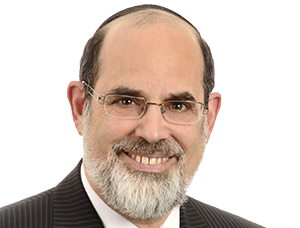Canadians currently enjoy individual rights unmatched in any prior era. That’s something
of which we can be proud. But how vigilant do we need to be in guarding those privileges?
Rabbi Raysh Weiss
Shaar Shalom Congregation, Halifax
Rabbi Debra Landsberg
Temple Emanu-El, Toronto
Rabbi Weiss: The test of tolerance is not whether one accepts others’ ideas that seem logical, but rather whether one can allow for others to believe in and practise religious ideas and philosophies with which one is unaccustomed or even uncomfortable. These days, especially in light of the broadly anti-religious expression in France and the recent conversations here in Canada around Quebec’s discriminatory Bill 62, I am both surprised and uncomfortable with the ways in which secular society, which supposedly espouses the value of pluralism, is attacking religious freedom.
The recently concluded holiday of Chanukah offers a case in point. Indeed, I have often wondered why it was that King Antiochus and the members of his Greco-Syrian administration, who were polytheists, had such a difficult time accepting the worship of an additional deity who did not happen to be in their already very large pantheon. Why was a temple dedicated to the “patron deity” of a small group of foreign subjects such an irritant to the mighty Greek overlords of a large swath of the ancient Middle East? What possible difference could it have made to them if the Jews were simply allowed to persevere in observing their quaint, ancient cult?
Rabbi Landsberg: I’m not sure that we can really count on the liberal pedigree of our Maccabean forebears. In fact, the historical approach to Chanukah is increasingly putting to rest the portrayal of the Maccabees as early defenders of freedom or, for that matter, proto-Zionists. As American writer Adam Garfinkle put it in a recent essay, modern Jews may very well “prefer to interpret Chanukah as being about religious freedom,” but “they are behaving 180 degrees out from what the original events of Chanukah were about. Back then, the public-opinion split between Jewish Hellenizers and traditionalists true to the faith was probably about 75/25.”
Rabbi Weiss: While it is true that the Hasmoneans represented a zealously anti-assimilationist stance and that they were, in fact, in (quite serious) conflict with the Jews who embraced Hellenization, and that the ensuing war did have a great deal to do with that conflict, the “story of Chanukah” that has been handed down to us for generations in its powerful mythological form is not to be sacrificed at the altar of modern academic literalism.
It’s a story that embodies respect for preserving Jewish tradition and defending it in the face of the onslaught of challenges and temptations that threaten Jewish continuity. Now more than ever, this is an important story. While secular historians might, in fact, prefer the “clean” historical facts, our heritage is more complex and much richer specifically because of the poetic and spiritual truths that have come to colour our uniquely Jewish perception of ourselves, our history and the world.
Rabbi Landsberg: The heart of the matter that you raised at the start of this conversation is not internal to the Jews. I recall vividly how, just a few years ago, I was in a well-known supermarket in Toronto in which, for the first time there, one of the cashiers was wearing a niqab. As I was leaving, a man identified himself as the manager and asked me a few blunt questions: was I comfortable with the cashier? Would I continue to shop there? My response was visceral. It was irrelevant whether I was “comfortable” with the cashier’s choice to wear a niqab, and therefore it would not impact my shopping habits.
Fundamentally, I think the conversation about religious freedom is a red herring. All of us in Canada live in times without historical parallel, in a society in which might is constrained and individuals are respected. This seemingly trite statement needs to be unpacked. This concept of society rests on no implied respect or understanding for any or no religious practice, but rather solely upon our shared citizenship.
Rabbi Weiss: Indeed, we can be proud to live in such a society. It is important to realize, however, that countervailing negative pressures exist in every society. The privilege we enjoy living in a country that emphasizes respect for all groups and individuals must be assiduously guarded. That’s exactly why legislation like Quebec’s Bill 62, which actively strips citizens of basic rights, must be addressed and confronted. Otherwise, they become a threat to the blessed feeling of “shared citizenship” that prevails in our present society.







